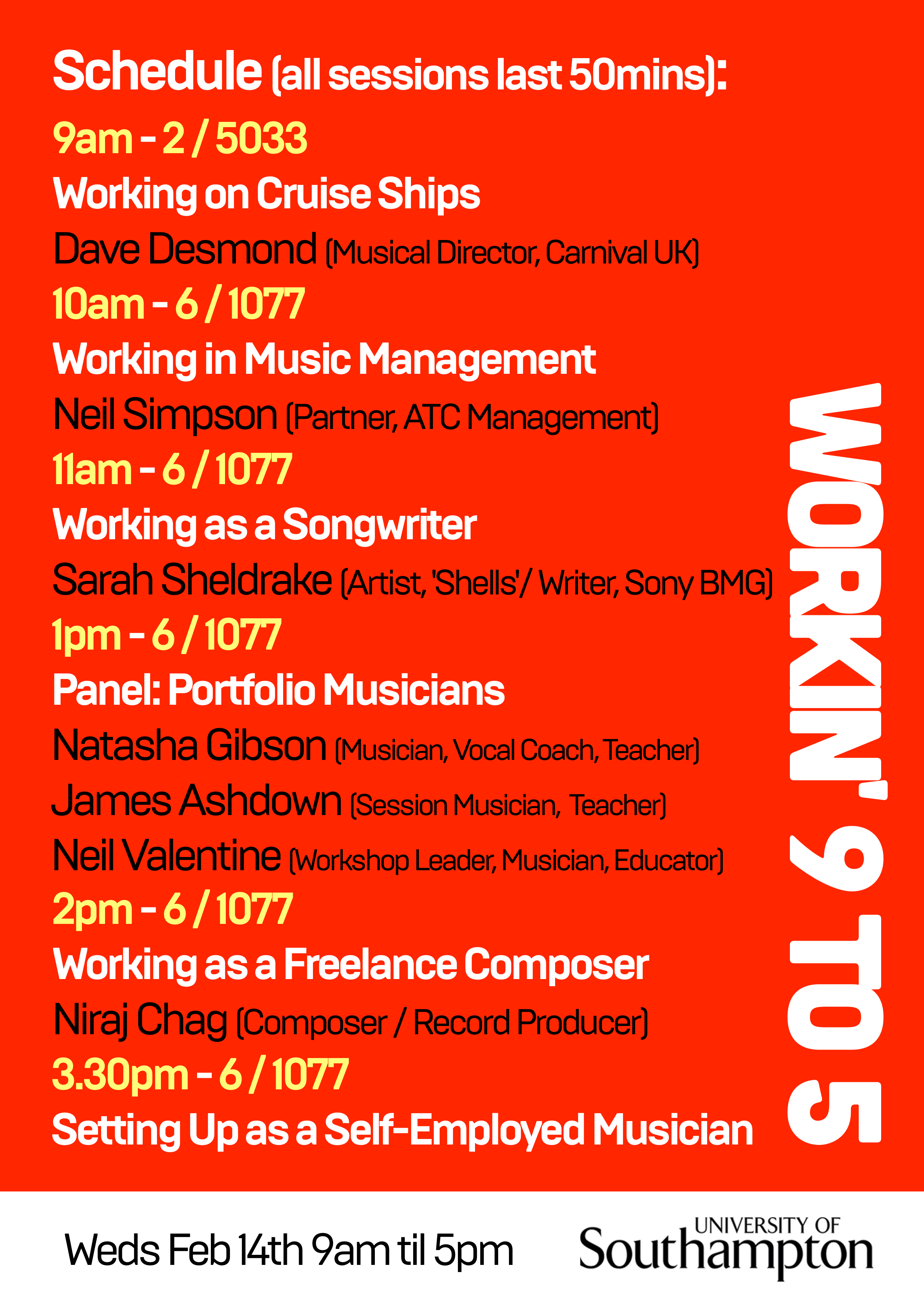Working in Music
 As third year students are approaching the end of their course, finalist Emma Atkins looks back to a February workshop aimed at helping undergraduates think about career choices in music: As I’m interested in many different aspects of music, this careers day was extremely beneficial. When I graduate I hope to work in the business side of the music industry, particularly in music marketing. In addition, at some point in my career I hope to work on cruise ships. Learning about each career perspective of the industry was very helpful due to there being many options to explore.
As third year students are approaching the end of their course, finalist Emma Atkins looks back to a February workshop aimed at helping undergraduates think about career choices in music: As I’m interested in many different aspects of music, this careers day was extremely beneficial. When I graduate I hope to work in the business side of the music industry, particularly in music marketing. In addition, at some point in my career I hope to work on cruise ships. Learning about each career perspective of the industry was very helpful due to there being many options to explore.
I was excited for the ‘Working on Cruise Ships’ talk as I was hoping to learn about a musician’s life on-board, and whether or not it is preferred to apply as a soloist or a band. Dave Desmond, Musical Director for Carnival UK, organised a presentation which explained the application process and a typical day on-board for a musician. He reiterated the benefits of life on board and explained that musicians are expected to play mainly during the evenings. Therefore, a typical day includes rehearsals and exploring new destinations around the world. The only aspect of the talk that concerned me is that it is preferred for a singer to apply as part of a band, and so this is something that I would have to develop if I decide to apply. Having learnt more about working on a cruise ship, I am definitely still interested in this career path, especially for a couple of contracts. (Editor’s note: check out Charlie Best’s professional page for an example of a recent grad who is trumpeting his way around the world on Princess Cruises.)
The next two talks were concerning the business side of the music industry, an area which I am very interested in. Manager Neil Simpson explained both his job role and the importance of venues in London such as Ronnie Scott’s Jazz Club, whereby an artist can get noticed and network. The main concept that I took away from this talk is the importance of networking, and the approach ‘it’s who you know, as well as what you know.’ He explained the different roles of a manager, such as setting targets for their artists and ensuring that they meet them.
Singer and songwriter Sarah Sheldrake’s presentation was very relevant to the careers day as she is a professional musician, which many students are working to become. Sarah emphasised the importance of having a part-time job alongside trying to make it as an artist. This is due to the pay-out from a record label often running out quicker than expected. This was a very useful piece of information, and I believe that many of us will take this on board when trying to become full-time musicians.
I didn’t go to the other half of the careers day; however, having talked to other students I discovered that it provided very helpful information for those who wanted to become teachers and self-employed musicians. As a result of attending, I now understand that despite wanting to work in the business side of the music industry, there is still the option to explore other paths such as songwriting and management. The broad range of job roles that the music industry provides makes it a very exciting environment to be part of, and this day has made me believe that it is possible to maintain a career in music.
For more thoughts on careers in music and the value of a music degree, check out the series of videos produced by the National Association for Music in Higher Education:
Ruth Morris explains her career working in community music for the Tenovus Cancer Care; Allison Balsom talks about how her degree prepared her for professional performing life; Adrian Sutton describes his work as a composer for stage and screen.

